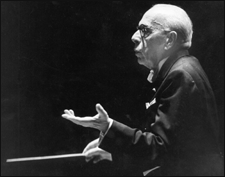If you’re a musician, do you keep in mind the whole length of the piece you’re playing? At the beginning, do you see ahead to the end and work with every phrase as a part of the journey toward that ending?
When I listen to a symphony or a piano concerto, my subconscious mind seeks to follow along on that trip, and the performers who speak to me the most are the ones who seem to be tapping into that overall arch.
The conductor George Szell was famous for having full energy for the finale (and helping the whole orchestra have that energy) because he paced every moment so well in anticipation of that final event.
One of my favorite aspects of Szell is his treatment of the hushed passage just before some finales, notably in such works as Beethoven’s 3rd (‘Eroica’) (at 42 min. in the linked video) and 6th (‘Pastoral’) (at 38 min. in the linked video), Bruckner’s 3rd (at 51-52 min. in linked video), Brahms's 4th (at 41 min.)and Dvorak’s 8th (after 33 min.) symphonies. I know of no one else who has so thoroughly developed the orchestra’s contemplative voice as in those thrillingly thoughtful and, yes, sweet times!
I don’t think he could have gotten that feeling without focusing the playing of the whole work on reaching that special world.
There are many genres in which the overall arch is important! Not just in the occasional piece with the hush toward the end, but in any form of musical development and conclusion.
When we play a folk tune, how does that apply? Do we really sense the way in which a particular melody moves and thus phrase the notes to enhance its logical and tale-telling movement through time? Shall there be a thrill of discovery in the ups and downs of pitch, time, and loudness, and in the final section, whether brassy or subtle?
Let’s consider how to cultivate this kind of artistic joy!
